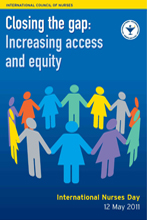
International Nurses Day 2011: Increasing Access and Equity
 May 12 is celebrated the world over as International Nurses Day, with this year’s theme calling particular attention to issues of access and equity in health care.
May 12 is celebrated the world over as International Nurses Day, with this year’s theme calling particular attention to issues of access and equity in health care.
Nurses make up the bulk of the health workforce, especially in sub-Saharan Africa, which has 5.5 nurses and midwives for every physician. While nurses’ contributions to the health system are well-established in the literature, to date, scant attention has been directed toward many of the critical issues nurses face in their careers.
Education
The status of nursing education in developing countries is poorly understood. There is no up-to-date global register of nursing schools, and we can only guess how many nurses are being educated in the developing world. The definition of a nurse varies from country to country to meet local needs and there is a great deal of overlap among different cadres that perform nurses’ functions.
Retention and performance
Due to mismatches between nursing education and community needs—as well as poor economic and professional opportunities—a significant proportion of nurses trained in the developing world choose to immigrate to Organisation for Economic Co-operation and Development (OECD) countries. The problem is particularly acute in some countries, such as Lesotho, where 18% of the nursing workforce eventually migrates to OECD countries creating a grave nursing shortage at home. The nurses that remain in their home countries often prefer to practice in urban settings rather than rural areas. Support systems
Support systems
Generally nurses’ support systems are weak in the developing world. Although most countries have nursing councils, many councils need improved capacity in order to properly regulate their profession. Continuing professional development opportunities are limited and the nursing cadre’s voice in the health planning establishment is inadequate. Underlying all of these problems is the paucity of data on the mechanisms needed to develop nursing workforce policies in developing countries.
New approaches
The US Government has invested significantly in improving nursing education in developing countries through programs such as the Nursing Education Partnership Initiative (NEPI). Through partner organizations, NEPI will collect quality data on the status of nursing education and help create the means to strengthen education programs in the developing world.
NEPI will take an approach that transformatively scales up the education of high-quality nurses, so that the cohorts of newly-educated nurses are adequately trained to perform well within the communities they are meant to serve. CapacityPlus is delighted to be a NEPI partner and lead the costing work on scaling up nursing education.
Related items:
Photo by Jennifer Solomon. Image courtesy of the International Council of Nurses


